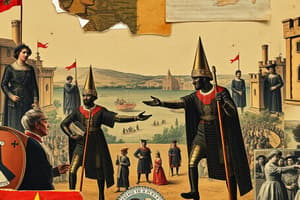Podcast
Questions and Answers
What is Feudalism?
What is Feudalism?
An economic and social system characterized by loyalty between a lord and his vassals.
Who were the two categories of vassals under Feudalism?
Who were the two categories of vassals under Feudalism?
Knights and serfs.
What was the primary obligation of knights to their liege lord?
What was the primary obligation of knights to their liege lord?
Military duty.
What type of work did serfs perform under Feudalism?
What type of work did serfs perform under Feudalism?
What did castles represent during the Medieval period?
What did castles represent during the Medieval period?
Which group of explorers discovered new lands like Iceland and Greenland?
Which group of explorers discovered new lands like Iceland and Greenland?
What were Crusaders seeking to do in their major expeditions?
What were Crusaders seeking to do in their major expeditions?
How did Monarchs influence kingdoms during the Medieval period?
How did Monarchs influence kingdoms during the Medieval period?
What method did Monarchs often use to create alliances with other royal families?
What method did Monarchs often use to create alliances with other royal families?
What was the primary role of family members in medieval society?
What was the primary role of family members in medieval society?
Flashcards are hidden until you start studying
Study Notes
Medieval History is an era spanning from the collapse of the Western Roman Empire, around AD 500, until early modern times, where societies were primarily agrarian and feudalistic. One key aspect of this period was the system known as Feudalism - an economic and social system characterized by loyalty between a lord and his vassals, who fell into two categories: knights and serfs. Knights were warriors with a military obligation to their liege lord while serfs worked the land under a form of slavery called servitude. During this time, castles began to appear across Europe, serving as symbols of power for lords over their lands.
Significant Explorers during the Medieval Period included Vikings who set sail from Scandinavia discovering new lands like Iceland, Greenland, and North America. They also left lasting impacts such as cultural changes, including religious ones, which can still be seen today in some places. In addition, there were also Crusaders, who were individuals participating in major expeditions against Muslim territory in the Middle East seeking to restore Christian control, leading to important changes in political, military, and religious life in Europe.
Family Members played crucial roles throughout medieval society. For instance, Monarchs had strong influence on how kingdoms operated; they could make or break treaties with other monarchs, often creating alliances through marriage between royal families. Additionally, Lords and Ladies took care of their estates using household staff and servants, essentially becoming miniature rulers themselves. Furthermore, soldiers used different tactics based upon what weapons they carried; archers typically fought from afar while heavy cavalry charged forward directly attacking foes. All these familial relationships were part of everyday life for people living in feudal societies.
Studying That Suits You
Use AI to generate personalized quizzes and flashcards to suit your learning preferences.




